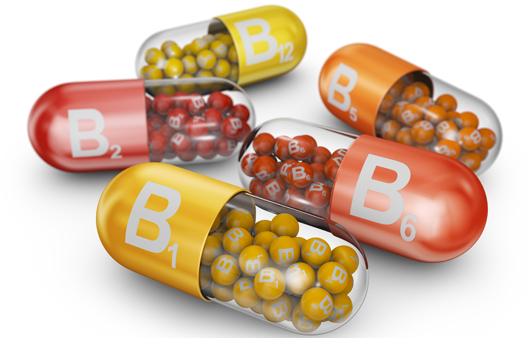People who want to take care of their health take nutritional supplements. However, if you eat all the nutritional supplements that are good for you, a situation arises where you do not know which nutritional supplements you are taking and why. A prime example is vitamin B supplements. Pharmacist Kim Ji-young explained the problems that occur when vitamin B deficiency occurs, saying, “People around me say that we need to eat vitamin B, but there are many people who don’t know why they need to take it.”
Vitamin B consists of a total of 8 typesㅣSource: Clip Art Korea
Vitamin B is a type of water-soluble vitamin, and what is left after use is excreted without being stored. Therefore, it is easy to be deficient not only in case of insufficient intake but also in case of increased need. Vitamin B group includes a total of 8 types, including vitamins B1, B2, B3, B5, B6, B7, B9, and B12, and each of these 8 types plays a different role in our body, so symptoms vary depending on the type of deficiency. .
Vitamin B1 (thiamin). Vitamin B1 plays a very important role in carbohydrate metabolism, so it is easy to be deficient in people who consume excessive alcohol or sugar. Since it is involved not only in energy metabolism but also in the metabolism of lactic acid, which is a fatigue substance, symptoms such as fatigue, loss of appetite, and mental anxiety appear when it is deficient. Severe deficiency can cause beriberi and peripheral neuropathy.
Vitamin B2 (riboflavin). Vitamin B2 helps metabolize carbohydrates, fats, and proteins, and is essential for cell growth and maintenance of vision, mucous membranes, and skin. Deficiency of vitamin B2 is rare, but deficiency can cause eyestrain, stomatitis, and dermatitis.
Vitamin B3 (nicotinamide). Vitamin B3 is necessary to maintain the normal life of all tissue cells. In addition, since it plays a role in strengthening the skin barrier, you can feel dry skin if it is deficient. Vitamin B3 has side effects such as flushing and burning when overdosed, so be careful not to exceed the maximum daily intake. If vitamin B3 is in the form of niacin, the maximum daily intake is 35 mg, but in the form of nicotinic acid amide, it is 1,000 mg.
Vitamin B5 (as pantothenic acid). Vitamin B5 plays many different roles throughout the body. Carbohydrates, fats, and proteins produce energy and are essential nutrients for the production of collagen, a component of skin and hair. Coenzyme A activates and metabolizes coenzyme, which is the key to the body’s response, so when it is lacking, various reactions in the body are braked. Symptoms such as anorexia, dermatitis, digestive tract ulcers, fatigue, and abdominal pain appear, and it also affects the synthesis of neurotransmitters, so a lack of it can cause depression.
Vitamin B6 (pyridoxine). Vitamin B6 is involved in a wide range of protein metabolism, particularly in the synthesis of hemoglobin, which carries oxygen in our body. In addition, it maintains the functions of the skin, mucous membranes and nerves. Therefore, deficiency can cause serious problems such as anemia, nerve damage, and reduced immune response due to reduced antibody production. When taking high doses of vitamin B6 for a long time, side effects such as ataxia and sensory neuropathy may occur, so care must be taken. The maximum daily intake is 100 mg.
Vitamin B7 (biotin). Vitamin B7 is involved in various metabolic functions and affects skin and hair. In particular, because it plays an important role in the strength and production of hair, a lack of biotin can cause hair loss.
Vitamin B9 (folic acid). Vitamin B9 is known as an essential nutrient for pregnant women because it is necessary for the synthesis of DNA and amino acids in the body and for the development of fetal nerves. Along with vitamin B12, it plays an important role in the production of red blood cells. Deficiencies in pregnant women can damage the neural tube of the fetus. It can cause birth defects such as cleft palate, so supplementation is recommended 3 months before conception to prevent this.
Vitamin B12 (as cyanocobalamin). Vitamin B12 is also necessary for the production of red blood cells, and a deficiency can cause anemia. It is also involved in the formation and function maintenance of nerve cells, and deficiency can cause peripheral nerve disorders such as neuralgia and numbness in the limbs.
Help = Pharmacist Kim Ji-young
<저작권©언론사 하이닥, 무단 전재 및 재배포 금지>
